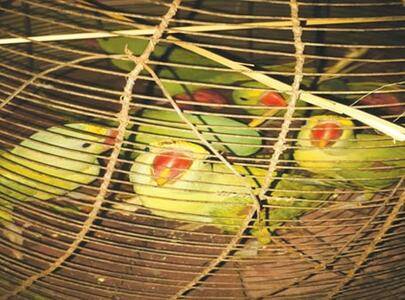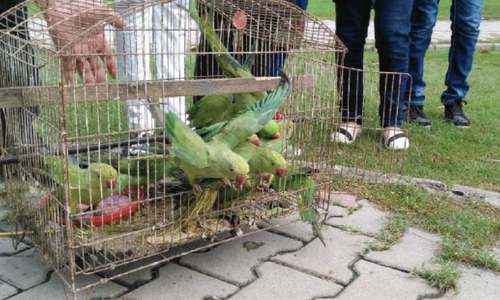Pakistan’s wild parakeet populations are facing a severe crisis, with experts warning that the iconic birds could soon disappear from the country’s forests and plains altogether.
High demand for the illegal pet trade, coupled with gradual habitat loss, has led to a dramatic decline in parakeet numbers over the past decade, making them prime candidates for extinction.
“The extent of the illegal trade of Parakeets is quite large in Pakistan because of their high demand for keeping them as pets, which leads the poachers to trap them from the wild in bulk quantities,” said Rab Nawaz, a senior official at World Wide Fund for Nature (WWF) Pakistan.
Speaking to Anadolu, he said that over the past 10 years, the high demand for illegally traded wild parakeets has led to a significant decline in the numbers of birds, once a common sight in the wild.
Echoing this, Anis Rehman, a wildlife expert based in Islamabad, described the smuggling of parakeets as “massively rampant” — stretching across the border regions with India in Azad Jammu and Kashmir, along with central and southern parts of Punjab.
He said that parakeets captured in these areas are sold into the local and international pet markets for significant sums of money, including by local communities, which are actively participating in the poaching and trafficking,
Many leave their regular jobs during the peak season to capture and sell the birds, maintained Rehman.
Risk of extinction
Habitat loss is another major factor driving the parakeets’ decline. The birds rely on old, dead trees with hollows to build their nests, but these are often indiscriminately cut down by people unaware of their vital ecological role.
“Old dead trees are cut down as they are considered to be useless but people are unaware about their ecological importance as they provide nesting sites to many bird species, including parakeets,” explained Mubeenullah Mobeen from the Himalayan Wildlife Foundation.
Pakistan is home to four parakeet species, with the Alexandrine parakeet being the most common. However, its population, along with those of its rose-ringed, slaty-headed and plum-headed cousins have seen a steep plunge.
“Parakeets were once commonly found in large numbers in plains and mountainous regions of Punjab, Sindh and Azad Kashmir. But now, their population has reduced and their distribution is restricted to [a] few border areas only,” said Nawaz.
Nawaz noted that all four native species had become locally endangered, though no recent surveys have been conducted to estimate their exact population.
Rehman, who is also the founding chairman of the Islamabad Wildlife Management Board, warned that barring serious efforts to recover the parakeet population, they would “soon” face imminent risk of extinction.
“The current number of parakeets is just a fragment. It is just a small percentage of the number of wild parrots we had about maybe 25-30 years ago,” he observed.
Experts warn that if urgent action is not taken to curb poaching and smuggling, as well as protect the parakeets’ dwindling habitats, the birds could soon vanish from the wild altogether.
“If we don’t do something now, the chances are that we will not find parakeets in the wild anymore,” cautioned Rehman.
Crucial for habitat
Highlighting the crucial role parakeets play in their ecosystems through seed dispersal and natural forest regeneration, the experts are calling for stringent measures against poaching and smuggling to recover their populations.
“Their droppings carry the seeds from one place to another, causing the natural spread of original forests,” Rehman said of the birds, which mainly eat wild fruits.
He warned that the extinction of the parakeets could leave “no natural forest spreading anymore” in the country.
For Nawaz, the solution lies in a “strict” ban on poaching and smuggling of parakeets until their population recovers.
“If the poaching pressure is contained, the [parakeet] population can be recovered in a few years,” he said.















































Dear visitor, the comments section is undergoing an overhaul and will return soon.